|
|
|
Sort Order |
|
|
|
Items / Page
|
|
|
|
|
|
|
| Srl | Item |
| 1 |
ID:
143344
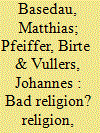

|
|
|
|
|
| Summary/Abstract |
Anecdotal evidence from many armed conflicts suggests that religion incites violence. Theoretically speaking, several facets of religion can create motives and opportunities to overcome the collective action problems associated with organized violence. However, empirical research has hitherto found no conclusive answer on the extent to which religion is connected to armed conflict onset. Contributing to the filling of this gap, we use a new database that incorporates important religious factors that previous studies left largely untested. The data set covers 130 developing countries for the period 1990 to 2010. Results from logistic regressions confirm our expectation that certain religious factors fuel armed conflict—in particular, the overlap of religious and other identities, religious groups’ grievances, and religious leaders’ calls for violence. We also find that religious determinants vary in their impact according to whether conflicts are religious or not in origin.
|
|
|
|
|
|
|
|
|
|
|
|
|
|
|
|
| 2 |
ID:
172329


|
|
|
|
|
| Summary/Abstract |
How does diffusion of civil war battles influence conflict termination? Recent advances in civil war literature have found that battle dynamics shape conflict termination by affecting the intra-conflict bargaining between disputants. This article extends the theoretical perspective and argues that how battles diffuse matters in determining conflict termination. While battlefield dynamics should in principle reveal previously unavailable private information, the relevance of information-revealing effect depends on the diffusion patterns of battles. The persistent, and possibly battle-exacerbated, commitment problem can also alter the prospects of conflict termination. We test the argument by distinguishing two distinct diffusion patterns of battles: distant and proximate. The empirical results reveal that distant diffusion, but not proximate diffusion, of battles makes civil conflicts less likely to terminate. The analysis also demonstrates that incorporating diffusion dynamics significantly improves our ability to predict conflict termination.
|
|
|
|
|
|
|
|
|
|
|
|
|
|
|
|
| 3 |
ID:
142492
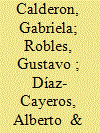

|
|
|
|
|
| Summary/Abstract |
In 2006, the Mexican government launched an aggressive campaign to weaken drug-trafficking organizations (DTOs). The security policies differed significantly from those of previous administrations in the use of a leadership strategy (the targeting for arrest of the highest levels or core leadership of criminal networks). While these strategies can play an important role in disrupting the targeted criminal organization, they can also have unintended consequences, increasing inter-cartel and intra-cartel fighting and fragmenting criminal organizations. What impact do captures of senior drug cartel members have on the dynamics of drug-related violence? Does it matter if governments target drug kingpins versus lower-ranked lieutenants? We analyze whether the captures or killings of kingpins and lieutenants have increased drug-related violence and whether the violence spills over spatially. To estimate effects that are credibly causal, we use different empirical strategies that combine difference-in-differences and synthetic control group methods. We find evidence that captures or killings of drug cartel leaders have exacerbating effects not only on DTO-related violence but also on homicides that affect the general population. Captures or killings of lieutenants, for their part, only seem to exacerbate violence in “strategic places” or municipalities located in the transportation network. While most of the effects on DTO-related violence are found in the first six months after a leader’s removal, effects on homicides affecting the rest of the population are more enduring, suggesting different mechanisms through which leadership neutralizations breed violence.
|
|
|
|
|
|
|
|
|
|
|
|
|
|
|
|
| 4 |
ID:
159247
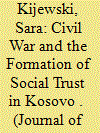

|
|
|
|
|
| Summary/Abstract |
While a new, growing subset of the literature argues that armed conflict does not necessarily erode social cohesion in the postwar era, we challenge this perspective and examine how civil war experiences shape social trust in Kosovo after the war from 1998 to 1999. Based on a nationwide survey conducted in 2010 and the disaggregated conflict event data set of the Armed Conflict Location & Event Data Project, we simultaneously analyze the impact of individual war-related experiences and exposure to war in the community through hierarchical analyses of twenty-six municipalities. Our findings confirm that civil war is negatively related to social trust. This effect proves to be more conclusive for individual war experiences than for contextual war exposure. Arguably, the occurrence of instances of violence with lasting psychological as well as social structural consequences provides people with clear evidence of the untrustworthiness, uncooperativeness, and hostility of others, diminishing social trust in the aftermath of war.
|
|
|
|
|
|
|
|
|
|
|
|
|
|
|
|
| 5 |
ID:
173133
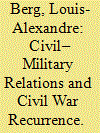

|
|
|
|
|
| Summary/Abstract |
Does restructuring security forces reduce the risk of civil war recurrence? Prior research has examined effects of military integration in alleviating commitment problems, but the evidence has been inconclusive. Other aspects of civil–military relations have received less attention. This article examines the effects of civil–military relations in the context of postwar struggles to consolidate authority. It outlines three pathways through which security forces contribute to renewed civil war: by excluding rival factions and facilitating insurgent mobilization, by exploiting control over resources to challenge the regime, or by escalating incipient insurgency through repression. Analysis of original, cross-national data on postwar civil–military relations shows that reducing the potential for exclusion and exploitation through diverse officer appointments and robust civilian oversight lowers the risk of civil war. These findings emphasize the distributive effects of restructuring security forces and highlight the value of examining political contests around state institutions to understand why civil wars restart.
|
|
|
|
|
|
|
|
|
|
|
|
|
|
|
|
| 6 |
ID:
162444


|
|
|
|
|
| Summary/Abstract |
What are the long-term effects of colonial institutions on insurgency? My article shows the historical origins of insurgency by addressing the puzzle of why the persistent Maoist insurgency, considered to be India’s biggest internal security threat, affects some districts along the central eastern corridor of India but not others. Combining archival and interview data from fieldwork in Maoist zones with an original district-level quantitative data set, I demonstrate that different types of British colonial indirect rule set up the structural conditions of ethnic inequality and state weakness that facilitate emergence of Maoist control. I address the issue of selection bias, by developing a new instrument for the British choice of indirect rule through princely states, based on the exogenous effect of wars in Europe on British decisions in India. This article reconceptualizes colonial indirect rule and also presents new data on rebel control and precolonial rebellions.
|
|
|
|
|
|
|
|
|
|
|
|
|
|
|
|
| 7 |
ID:
152418
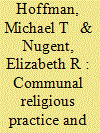

|
|
|
|
|
| Summary/Abstract |
Does religion inevitably promote support for militant politics? Using a new and unique data set compiled from a nationally representative survey in Lebanon, we examine the conditions under which communal religious practice may serve to promote support for or opposition to armed parties. We argue that this relationship, far from being unidirectional and consistent, depends on the interests of the individual sectarian group. For groups engaged in conflict, communal prayer may increase support for arming political parties. For noncombatant groups, however, religion tends to promote opposition to such militarization. Using both observational and experimental evidence, we demonstrate that communal religion increases the salience of group interests through both identity and informational mechanisms. For regular worship attenders, communal religious practice increases the salience of sectarian identity. For nonattenders, informational primes about sectarian interests have the same effect. Among noncombatant groups, this increased salience leads to opposition to armed parties whose presence would threaten the livelihoods and security of those on the sidelines.
|
|
|
|
|
|
|
|
|
|
|
|
|
|
|
|
| 8 |
ID:
052804
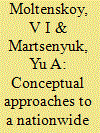

|
|
|
| 9 |
ID:
164161
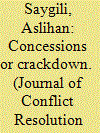

|
|
|
|
|
| Summary/Abstract |
A prominent view in the terrorism literature is that democracies make soft targets for terrorists due to their citizenry’s low tolerance for civilian casualties. This study tests this claim in the context of hostage taking terrorism, which is a unique form of violence that coerces the target state into negotiating over its citizens’ lives under public scrutiny. I argue that democratic accountability generates softer responses to hostage crises only in mature democracies, where leaders’ concern over being held accountable for the human costs of a no-concessions policy outweighs the reputational costs of conceding to terrorists’ demands. Using data on government responses to hostage incidents from 1978 to 2005, I find that regime type becomes a significant predictor of target concessions only at higher levels of regime stability. To test the accountability mechanism proposed by theory, I examine the effect of electoral cycles on target response; as expected, while nearing elections soften democratic responses to hostage crises, in general their positive effect on the likelihood of concessions is stronger in consolidated democracies.
|
|
|
|
|
|
|
|
|
|
|
|
|
|
|
|
| 10 |
ID:
159246
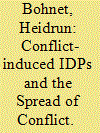

|
|
|
|
|
| Summary/Abstract |
Recent scholarship has found evidence that refugee flows may inadvertently contribute to the spread of conflict across borders. Little is known, however, about the spatial diffusion of conflict within a state’s borders and what role internal displacement plays in such a dynamic. This question is of relevance because of the particular marginalization of internally displaced persons, which make them at risk of predation and militarization by armed groups. Drawing on a novel global data set on internal displacement, we evaluate this question and find evidence for a similar mechanism leading to conflict spread operating at the domestic level.
|
|
|
|
|
|
|
|
|
|
|
|
|
|
|
|
| 11 |
ID:
193111
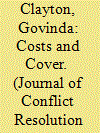

|
|
|
|
|
| Summary/Abstract |
Ceasefires are common in civil conflict. Yet we have surprisingly little comparative analysis of why and under what conditions they occur. A ceasefire provides temporary relief from the costs of conflict, but also generates its own costs. Building on this logic, we argue that conflict parties are more likely to accept the costs associated with a ceasefire when the conflict costs are greater, in particular, when: violence is intense; there are higher levels of ‘collateral damage’; and the parties lack international support. Second, we contend that ceasefires are also more likely in those periods in which the audience costs associated with entering into an arrangement are lower, specifically, when the parties have some form of ‘political cover’, such as during mediation. We find support for both arguments in an analysis of a new dataset capturing all ceasefire in civil conflict from 1989-2020, using a series of dyad fixed effect models.
|
|
|
|
|
|
|
|
|
|
|
|
|
|
|
|
| 12 |
ID:
159865
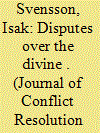

|
|
|
|
|
| Summary/Abstract |
This article introduces the Religion and Armed Conflict (RELAC) data, 1975 to 2015, which is a new data set suitable for analyzing the causes, dynamics, and resolution of religious conflicts. It contains information about key religious dimensions of conflicts: whether the issue at stake is religious, the actors’ religious identity, and fine-grained data about the type and salience of religious claims. The article presents the major features of the data set and describes patterns and trends that shed new light on religious conflicts, for example, by demonstrating that conflicts over Islamist claims have become more prevalent. We also illustrate the utility of the data. For instance, we show that there is great variation in lethality across conflicts with different types of Islamist claims, thereby offering a more nuanced understanding of the deadliness of religious conflicts. RELAC should be a valuable resource for scholars, examining religious dimensions of intrastate armed conflicts.
|
|
|
|
|
|
|
|
|
|
|
|
|
|
|
|
| 13 |
ID:
165888
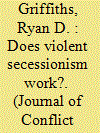

|
|
|
|
|
| Summary/Abstract |
Recent research suggests that the strategic use of violence may increase a group’s chance of gaining independence. We investigate this topic using comprehensive data on all secessionist movements between 1900 and 2006 and an original data set on the institutional and extrainstitutional methods that secessionists have used from 1946 to 2011. Our analysis yields several important findings. First, strategy depends on context. Not all secessionist movements are the same, and many have legal and/or institutional routes to independence that shape the methods that they employ. Second, no secessionist movement challenging a contiguous state has won its sovereignty without using institutional methods, either exclusively or in combination with extrainstitutional methods. Finally, we identify four successful combinations of secessionist methods and discuss how these movements develop in relation to their strategic setting. Overall, we find no evidence that violence helps a secessionist movement to gain independence.
|
|
|
|
|
|
|
|
|
|
|
|
|
|
|
|
| 14 |
ID:
152122
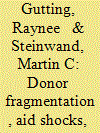

|
|
|
|
|
| Summary/Abstract |
Recent debates have focused on the negative role of the proliferation of foreign aid facilities and donor fragmentation for development outcomes and recipient country institutions. This article investigates an overlooked positive side effect of donor proliferation. With an increasing number of donors, exposure to negative aid shocks decreases, as well as the impact of such shocks on violent political conflict. Using data on 106 recipient countries for the years 1970 to 2008 and employing event history and mediation analysis, we find strong evidence that fragmentation significantly reduces the risk for political destabilization associated with aid shocks.
|
|
|
|
|
|
|
|
|
|
|
|
|
|
|
|
| 15 |
ID:
160789
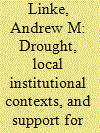

|
|
|
|
|
| Summary/Abstract |
We address two questions on the effects of climate change for social instability. First, do droughts and their associated environmental impacts affect support for the use of violence? Second, do local-level formal and informal institutions moderate support for violence when and where droughts worsen? To answer these questions, we conducted a national survey of 1,400 Kenyans in 2014. Respondents were asked about patterns of rainfall and the presence of rules regulating natural resource use and access. Survey data are joined to spatially disaggregated observed rainfall trends. The survey uses endorsement experiments to elicit honest responses about support for using violence. There is some evidence of a direct, though limited, link between observed drought and violent attitudes. Certain local-level natural resource use rules have moderating effects on support for violence where drought is reported and precipitation is less frequent. This conditional and contextual effect is an important modification of overly simplistic narratives of universal climate change effects.
|
|
|
|
|
|
|
|
|
|
|
|
|
|
|
|
| 16 |
ID:
175346
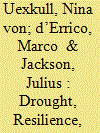

|
|
|
|
|
| Summary/Abstract |
The effects of climate variability and change on security are debated. While this topic has received considerable attention in both policy circles and academia, the microlevel pathways and conditions under which climatic shocks increase conflict risks are poorly understood. We suggest that household resilience provides one key to understanding these relationships. Using novel household survey data from two conflict-affected regions in Eastern Democratic Republic of the Congo, we study variation in the support for violence related to reported exposure to drought and resilience metrics. Using comprehensive multifaceted objective and subjective indicators of resilience, we find that less resilient respondents who report having experienced drought and associated losses are more likely to be supportive of the use of political violence. In contrast, our findings suggest that there is no general association between reporting drought exposure and support for violence.
|
|
|
|
|
|
|
|
|
|
|
|
|
|
|
|
| 17 |
ID:
155783
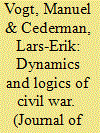

|
|
|
|
|
| Summary/Abstract |
This article reviews the literature on civil war. We focus on the most recent period of scholarly activity, beginning in the early 2000s when the publication of prominent quantitative studies triggered a surge in the empirical research of civil war as a well-defined conceptual category. We identify three explanatory logics that have dominated much of this literature and that view civil wars as a consequence of greed, grievances, and opportunities, respectively. We evaluate the arguments and findings of these theoretical approaches with respect to each of the main phases of war: outbreak, wartime dynamics, conflict termination, and postwar recovery. The article concludes by identifying key challenges confronting future civil war research. In particular, we emphasize the continuing need to advance theories that bridge the main explanatory logics as well as the different phases of conflict. Researchers should also pay more attention to defining the appropriate spatiotemporal scope of their studies.
|
|
|
|
|
|
|
|
|
|
|
|
|
|
|
|
| 18 |
ID:
163431
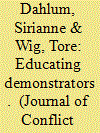

|
|
|
|
|
| Summary/Abstract |
Does a more educated population spur regime-challenging mass protest? It is commonly argued that educated individuals are more likely to collectively challenge governments through protests and that this may explain why education is associated with democratization. While many studies have investigated education’s effect on conventional political participation (voting, petitioning, etc.), it is not known whether education levels affect contentious mass protest. This article argues that education increases the frequency of mass protest, by alleviating collective-action problems and motivating mass opposition, particularly in autocracies. These links are investigated at the subnational level in Africa, by mapping over 600,000 survey respondents to spatialized protest-event data. We present evidence that areas with more educated populations have higher levels of protest activity, and we find mixed evidence consistent with both opportunity- and grievance-related mechanisms driving this relationship. We proceed to identify the causal effect of education by using the location of colonial-era Christian missions to instrument for local education levels.
|
|
|
|
|
|
|
|
|
|
|
|
|
|
|
|
| 19 |
ID:
186330
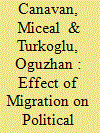

|
|
|
|
|
| Summary/Abstract |
In recent years, a record number of people have been forcibly displaced or migrated due to conflict. Whilst established political science research suggests that displaced communities are an added risk factor for conflict due to their support for extreme co-ethnic political parties and movements, this has been challenged by recent research which shows that migrants can be a moderating force. We offer a potential reconciliation of these divergent findings by distinguishing between first- and second-generation migrants. Due to their relative lack of conflict exposure, second-generation migrants will have significantly less support for co-ethnic political parties than first-generation migrants and those who remain. We test our argument using granular survey data comparing Kurds who migrated out of the conflict zone in Turkey with those who remained. The results support our theoretical framework and have important implications for our understanding of migrant attitudes and the long-term effects of conflict exposure.
|
|
|
|
|
|
|
|
|
|
|
|
|
|
|
|
| 20 |
ID:
156536
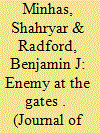

|
|
|
|
|
| Summary/Abstract |
There has been much disagreement about the relationship between civil wars and state economic performance. While civil war is often associated with poor economic performance, some states have managed robust growth despite periods of domestic armed conflict. We find this disagreement results from not accounting for the spatial distribution of conflict within a country. A robust literature in economics stresses the role major cities play in economic growth. We hypothesize that the economic impact of civil conflict is contingent on the conflict’s location relative to major urban centers within a state. We use subnational data on the location of conflict relative to urban areas to test the impact of domestic conflict on annual gross domestic product growth. In doing so, we bridge the economic development literature on the importance of cities with extant literature on the effect of armed conflict to provide a novel explanation for the paradox of high macroeconomic growth in conflict-ridden countries.
|
|
|
|
|
|
|
|
|
|
|
|
|
|
|
|
|
|
|
|
|